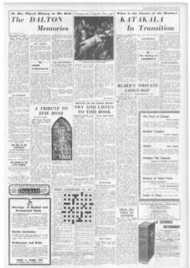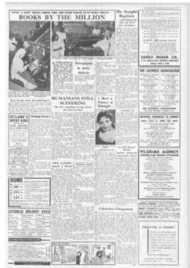Page 3, 10th May 1957
Page 3

Report an error
Noticed an error on this page?If you've noticed an error in this article please click here to report it.
Tags
Share
Related articles
Soul Raid Precautions (i)
Schools Chronicled
Fr. C. C. Martindale,
40 Chaps Prepare For New Life
I Bookshelf I
BLAKE'S 'PRIVATE LANGUAGE'
By Fr. C. C. MARTINDALE, S.J.
SELECTED POEMS OF WILLIAM BLAKE. edited by F. W. Rateson (Heinemann, 9s. 6d.).
WE Ore, to the indignation of Miss Evelyn Underhill, called Blake a mystique manqué. Compare Mozart. He was but four when a lucid music was welling up in his mind and poured along its untormented way till he died in his thirties. As a musician. a miracle almost in his cradle, he never " failed," perhaps because he did not try to enter Heaven or Hell.
Blake, also at four, started his unearthly visions, was beaten for it, and grew to have a mind ailernately (if not simultaneously) full of writhing snakes and a dazzle of angels.
His repressed adolescence took revenge by causing him to hate all formalism. political or ecclesiastical; he wrote songs of " Innocence" and "Experience." some of them so lovely or so tragic as to make part of our national inheritance. When he was about 34 he ceased to write thus, save the incomparable " And did those feet in ancient times ." But unfortunately, as Mr. Bateson in his invaluable notes reminds us, we must not lake even this at its face value but in accord with Blake's system of symbolism: the feet ' are those of " Albion," a sort of primeval giant of whom " Jerusalem "-the innocent world of imagination was an "emanation" antedating the " dark Satanic mills" of mechanical Rationalism.
We are reminded that Blake had never been to school, whence his lapses in mere grammar, forgivable as are not Bro-wning's irritating omissions of pronouns, conjunctions and so on (Blake's fondness for of " followed by an abstract " youth of delight " meaning "delightful youth," etc.is simply a Hebraism due to his immersion in the Old Testament).
But, as Mr. Bateson so acutely points out (p. 91 ff.), he tended to allow his " inward eye" to see at the expense of the " outward' eye; thus a thistle really was, for him, an " old man grey," rather as though Wordsworth's " yellow primrose " not only was that and something " more," hut stopped being a primrose altogether. His own definition of the "sublimest poetry " is "allegory addressed to the intellectual powers, while altogether hidden from the corporeal understanding." So as time went on Blake developed a " private language " which needs to be " decoded "; if we are willing to try to do this, Mr. Bateson wishes us bon voyaget Blake unhappily cluttered up his mind with so much pseudo-learning that I shall regret that he never became what I think he might have been-was, in fact, a mystique manquel. I am glad that after so many disillusionments about the French Revolution and
so forth, and then all-but despair, he reverted to some form of Christianity that may have pacified even his "mental strife"; and I shall continue to read with a minimum of analysis his lovely earlier songs, and shall always be grateful to Mr. Bitteson for helping me to do so without insisting that I must go much further,
blog comments powered by Disqus









